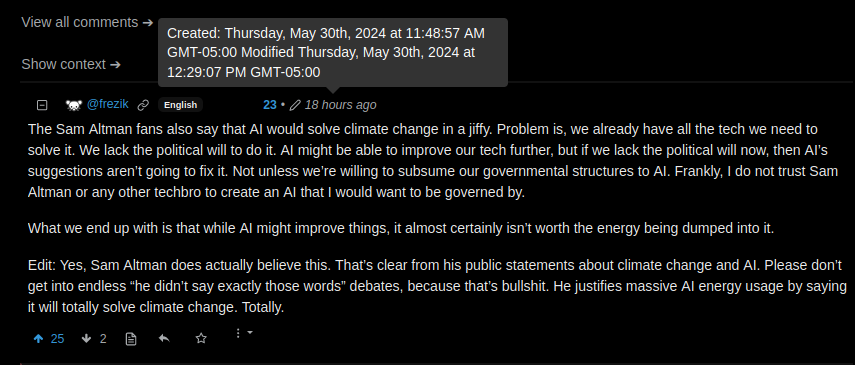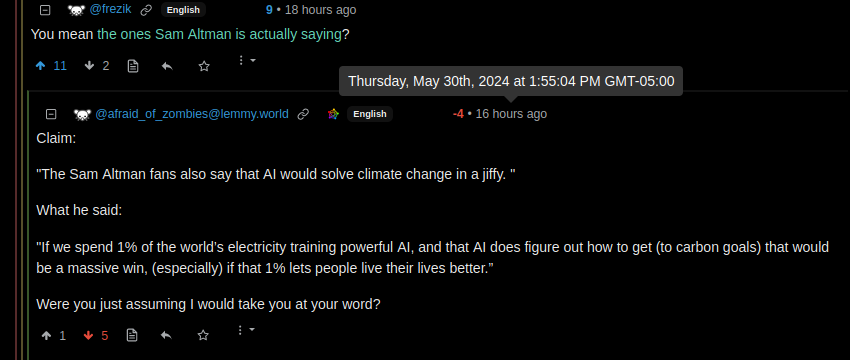Yeah, that's kinda what my GP post was getting at. But it's all managed by corporations, not individuals.
frezik
Setting up a web of trust could cut out almost all spam. Of course, getting most people to manage their trust in a network is difficult, to say the least. The only other solution has been walled gardens like Facebook or Discord, and I don't have to tell anyone around here about the problems with those.
Not really, I just have trust issues with my ISP, and I'm willing to spend three bucks a month to work around them.
Yeah, those old fabs are still useful. Here's what Microchip Technology Inc runs:
https://ww1.microchip.com/downloads/en/DeviceDoc/00004075.pdf
See page 6.Their fab in Lawrence, MA only goes down to 1000nm. Their other locations go down to 250 or 110nm. IIRC, some of that is the auto industry refusing to port things off of old chips, but the point is that you can do a lot of useful stuff with horribly outdated fabs.
I'm hoping my makerspace will be able to do something like that in the future. We'd need funding for a much bigger internet connection, at least three full time systems people paid market wages and benefits (three because they deserve to go on vacation while we maintain a reasonable level of reliability), and also space for a couple of server racks. Equipment itself is pretty cheap--tons of used servers on eBay are out there--but monthly costs are not.
It's a lot, but I think we could pull it off a few years from now if we can find the right funding sources. Hopefully can be self-funding in the long run with reasonable monthly fees.
IIRC, it's nearly impossible to self-host email anymore, unless you have a long established domain already. Gmail will tend to mark you as spam if you're sending from a new domain. Since they dominate email, you're stuck with their rules. The only way to get on the good boy list is to host on Google Workspace or another established service like Protonmail.
That's on top of the fact that correctly configuring an email server has always been a PITA. More so if you want to avoid being a spam gateway.
We need something better than email.
I agree, and I think there's some reliability arguments for certain services, too.
I've been using self-hosted Bitwarden. That's something I really want to be reliable anywhere I happen to be. I don't want to rely on my home Internet connection always being up and dyn DNS always matching. An AWS instance or something like that which can handle Bitwarden would be around $20/month (it's kinda heavy on RAM). Bitwarden's own hosting is only $3.33/month for a family plan.
Yes, Bitwarden can work with its local cache only, but I don't like not being able to sync everything. It's potentially too important to leave to a residential-level Internet connection.
Why do you keep embarrassing yourself?
Unfortunately for you, we can actually see edit and post times on comments:

My comment, last edited May 30, 12:29:07 GMT-5.

Your comment, posted May 30, 1:55:04 GMT-5.
So it wasn't an hour before. It was closer to 1.5 hours. You got me.
This isn't just about internet points. You're defending a shithead on the basis of "he didn't say exactly those words", as if context does not exist.
They have doubled in capacity: https://rockymntstage.wpengine.com/wp-content/uploads/2024/01/slide-2-battery-charts.png
They have high power and low power cores. Borrowed the idea from "BIG.little" design from ARM.
Base load is not necessary. It was made because you could build certain types of plants really cheap if they're run all the time at the same level. They aren't a requirement, but rather an economic convenience in an old way of doing things.
Renewables with storage are able to match demand more closely than traditional plants ever could. This results in less wasted power. That means we don't have to replace every GWh of traditional generation with a GWh of renewable.
Hydro and geothermal have both had some interesting breakthroughs the last few years. Small scale hydro can get useful amounts of power from smaller rivers than was feasible in the past. There are places to put them we didn't have before.
There's also high voltage DC lines. The longest deployed one is currently in Brazil, and is about 1500 miles. An equivalent run in the US would mean wind farms in Kansas could power New York, or solar in Arizona could power Chicago. When you can transmit that far, then the wind is always blowing somewhere, and it's sunny somewhere for the entire day, as well.
Nuclear lost its window of opportunity. It may already be cost competitive with putting solar panels in space.
Edit: fixing autocorrect's bad corrections